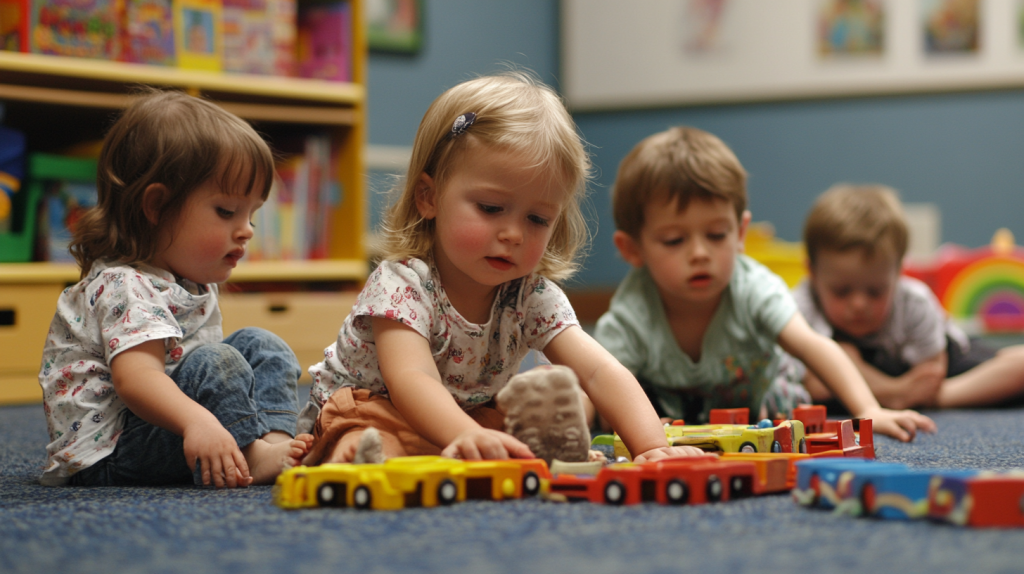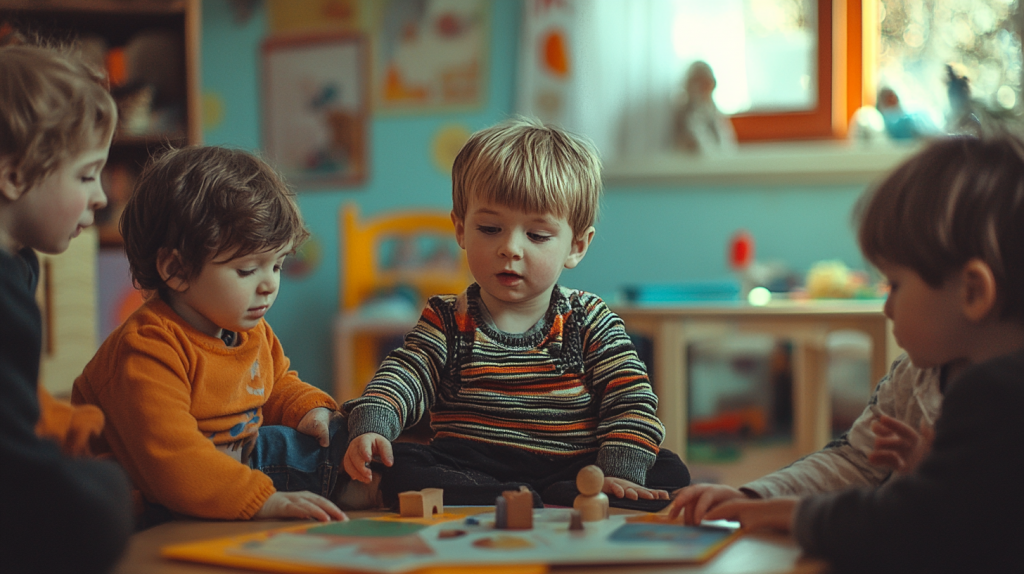Circle time is a designated period during which children gather together, typically in a circle, to engage in various group activities. This setting promotes inclusivity and ensures that everyone can see and hear each other, which is essential for effective communication. The circular arrangement eliminates the hierarchy often present in traditional classroom settings, fostering a sense of equality and openness among participants.
The activities conducted during circle time vary but generally aim to enhance social interaction, develop listening skills, and foster a sense of community. From storytelling to games and discussions, circle time provides a unique opportunity for children to learn and grow together. By participating in these activities, children practice taking turns, sharing their thoughts, and listening to others, which are foundational aspects of social interaction and relationship-building.
Why Circle Time is Essential for Social Skill Development
Encouraging Communication
One of the primary goals of circle time is to improve communication skills. By participating in group discussions and activities, children learn how to express their thoughts, listen to others, and respond appropriately. This practice is invaluable as it lays the foundation for effective communication in later life. Circle time encourages children to articulate their ideas and emotions, enhancing their ability to convey thoughts clearly and understand the perspectives of others.
Furthermore, circle time provides a safe environment for children to experiment with language and express themselves. This setting helps to reduce the fear of making mistakes, allowing children to build confidence in their communication abilities. As they grow more comfortable speaking in front of a group, they develop the courage to voice their opinions and engage in meaningful conversations, skills that are crucial for personal and academic success.
Building Empathy and Understanding
Circle time activities often involve sharing personal experiences or discussing various topics. These interactions help children develop empathy by understanding different perspectives and emotions. As they listen to their peers, they begin to appreciate that everyone has unique thoughts and feelings, fostering a sense of empathy and compassion. This empathetic understanding is crucial for forming positive relationships and resolving conflicts amicably.
Moreover, by engaging in circle time discussions, children become more attuned to the emotional cues and non-verbal signals of others. This heightened awareness helps them respond more thoughtfully and considerately, further reinforcing empathetic behaviors. The ability to empathize with others is an essential component of emotional intelligence, which is linked to improved social interactions and overall well-being.
Promoting Cooperation
Group activities during circle time require children to work together towards a common goal. Whether playing a game or solving a problem, they learn the importance of teamwork and cooperation. These experiences teach children how to collaborate, negotiate, and compromise—essential skills for any social setting. Cooperation during circle time fosters a sense of belonging and mutual respect, which are vital for building a supportive community.
In addition, circle time activities that emphasize cooperation help children understand the value of diverse perspectives and the strength of collective effort. When children work together, they learn to appreciate each other’s strengths and contributions, which encourages a collaborative mindset. This skill is not only beneficial in social interactions but also in future academic and professional endeavors where teamwork is often key to success.
Enhancing Listening Skills
Active listening is a critical component of effective communication. During circle time, children practice listening to their peers and teachers, learning to focus on what is being said and respond thoughtfully. This skill not only enhances their ability to communicate but also helps them succeed in academic and social settings. Active listening requires attention and concentration, which are essential for processing information and engaging in meaningful dialogue.
Additionally, by participating in listening-focused activities, children learn to interpret and understand verbal and non-verbal messages. This capability is crucial for navigating social interactions and forming strong, positive relationships. As children become better listeners, they develop a deeper understanding of others, which enriches their social experiences and fosters a harmonious community.

Circle Time Activities for Building Social Skills
To maximize the benefits of circle time, it’s essential to incorporate activities that specifically target social skill development. Here are some effective circle time activities you can use to enhance communication, empathy, cooperation, and listening skills.
Storytelling and Sharing
Invite children to share a personal story or experience with the group. Encourage them to listen respectfully to each speaker and ask questions to learn more about their peers. This activity not only enhances communication skills but also fosters empathy and understanding. Storytelling allows children to practice organizing their thoughts and expressing themselves clearly, which are key components of effective communication.
Furthermore, sharing personal experiences helps to build trust and rapport among group members. As children open up about their lives, they gain insights into the experiences of others, fostering a deeper sense of connection and community. This mutual sharing and understanding lay the groundwork for strong, supportive relationships that extend beyond the classroom.
Role-Playing Games
Role-playing activities allow children to step into someone else’s shoes and explore different perspectives. For example, you could have them act out a scenario where they need to resolve a conflict or help a friend in need. These exercises promote empathy and teach children how to navigate social situations. Role-playing also encourages creative thinking as children consider various ways to approach and resolve scenarios.
Additionally, role-playing provides a safe space for children to practice social interactions and problem-solving skills. By experimenting with different roles and responses, they gain confidence in their ability to handle real-life situations. This practice not only enhances their social skills but also empowers them to approach challenges with a positive and proactive attitude.
Cooperative Games
Games that require teamwork are excellent for promoting cooperation and collaboration. Activities like group puzzles, building challenges, or relay races encourage children to work together and support one another to achieve a common goal. These cooperative games highlight the benefits of teamwork and the importance of each individual’s contribution to the group’s success.
Moreover, cooperative games help children develop trust in their peers and an appreciation for diverse abilities and perspectives. As they work together to solve problems or complete tasks, they learn to value and depend on each other’s strengths. This collaborative spirit fosters a sense of unity and belonging, which is essential for a harmonious and inclusive community.
Listening Exercises
Incorporate activities that focus on listening skills, such as “Simon Says” or “Follow the Leader.” These games require children to pay close attention to instructions and respond accordingly, enhancing their ability to listen and follow directions. Listening exercises help children develop focus and concentration, which are crucial for academic and social success.
In addition, by participating in listening activities, children practice interpreting verbal cues and responding appropriately. This skill is essential for effective communication and helps to prevent misunderstandings and conflicts. As children become adept listeners, they enhance their ability to engage in meaningful conversations and build positive relationships.

Implementing Circle Time in Your Classroom
Setting the Stage
To create a successful circle time environment, it’s essential to establish a routine and set clear expectations. Begin by explaining the purpose of circle time and the importance of respect and active participation. Encourage children to take turns speaking and listening to one another, fostering an inclusive and supportive atmosphere. Establishing ground rules at the outset helps to create a respectful and focused environment where everyone feels comfortable participating.
Creating a warm and inviting space for circle time is also important for setting the right tone. Arrange the seating to ensure that everyone can see and hear each other, and consider incorporating visual aids or props to enhance engagement. A welcoming environment encourages children to be open and engaged, maximizing the benefits of circle time.
Choosing the Right Activities
Select activities that align with your educational goals and the needs of your students. Consider the age, interests, and abilities of your class when planning circle time sessions. By choosing engaging and age-appropriate activities, you can ensure that all children are actively involved and benefiting from the experience. Tailoring activities to the specific needs of your group helps to maintain interest and motivation.
It’s also beneficial to vary the types of activities to keep children engaged and provide opportunities for different skills to be practiced. Rotating between storytelling, games, and discussions keeps the sessions dynamic and caters to diverse learning styles. This variety ensures that all children have the opportunity to develop a broad range of social skills during circle time.
Consistency is Key
To maximize the benefits of circle time, it’s important to incorporate it into your daily or weekly routine. Consistency helps children become familiar with the structure and expectations, allowing them to fully engage and develop their social skills over time. Regular practice reinforces the skills learned during circle time and helps to integrate them into daily interactions.
Moreover, consistent circle time sessions provide a stable and predictable environment that children can rely on. This routine offers a sense of security and stability, which is particularly beneficial for younger children. By making circle time a regular part of the schedule, you create a reliable framework for social skill development that can have lasting positive effects.
The Long-term Benefits of Circle Time
The skills children develop during circle time extend far beyond the classroom. As they grow, these social skills become invaluable assets in their personal and professional lives. Effective communication, empathy, cooperation, and active listening are essential for building strong relationships, resolving conflicts, and succeeding in various social settings. The ability to navigate social situations with confidence and competence is a key determinant of success in many areas of life.
Conclusion
Circle time is a powerful tool for fostering social skills in young children. By incorporating structured group activities that promote communication, empathy, cooperation, and listening, educators can help children develop the skills they need to thrive in our increasingly interconnected world. Whether you’re a teacher, parent, or caregiver, embracing the power of circle time can make a lasting impact on a child’s social development and future success. As these children grow into adults, the foundational skills learned during circle time will continue to serve them well, enabling them to build meaningful connections and navigate the complexities of modern life with ease.
Contact Discovery Time Learning Center for Full and Part-Time Daycare
Are you looking for a nurturing environment that fosters social skills and personal growth for your child? At Discovery Time Learning Center, we offer both full and part-time daycare options designed to support your child’s development through engaging activities like circle time.
Contact us today to learn more about our programs and how we can help your child thrive in a supportive community. Don’t miss the opportunity to give your child the best start in their educational journey!



